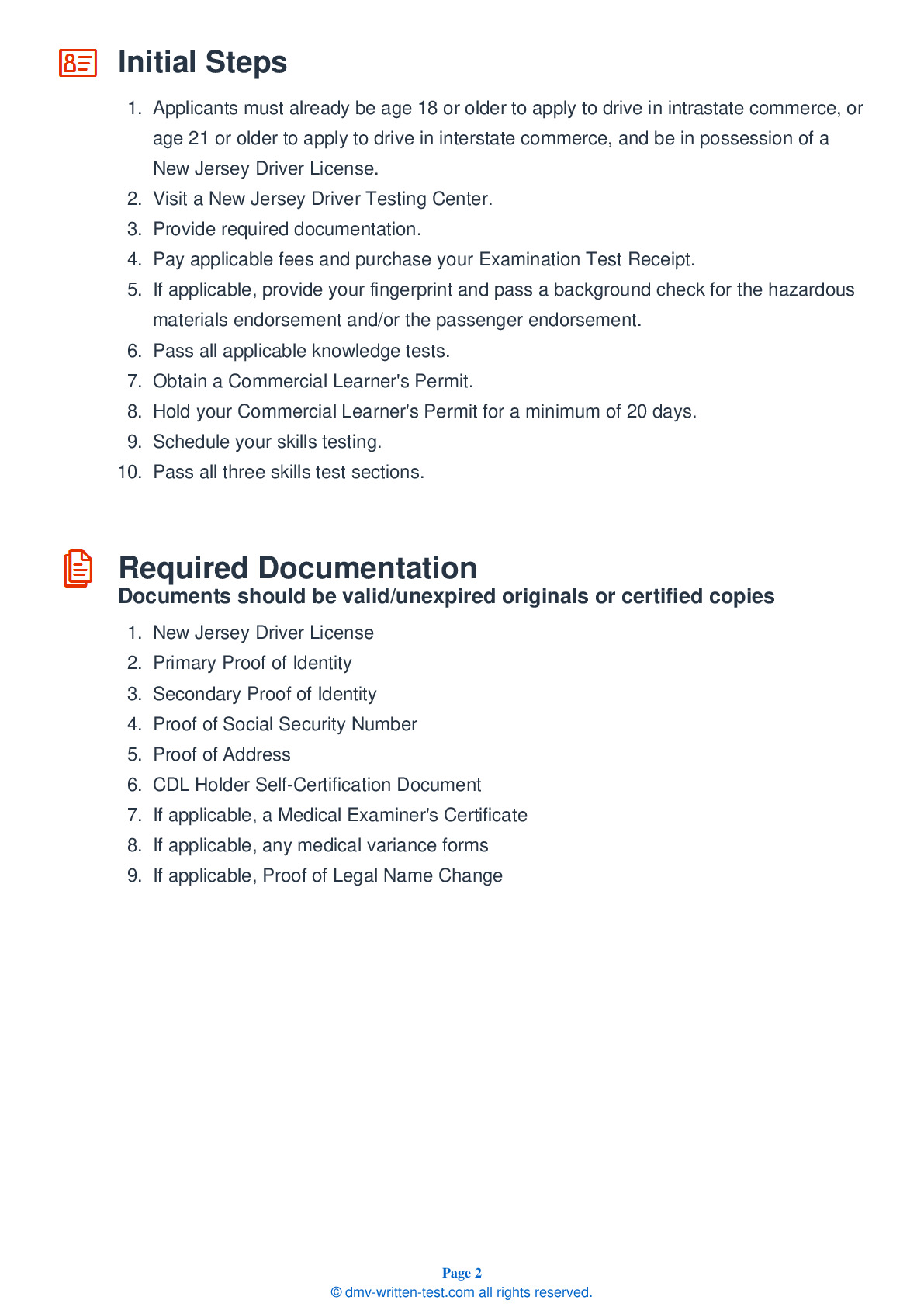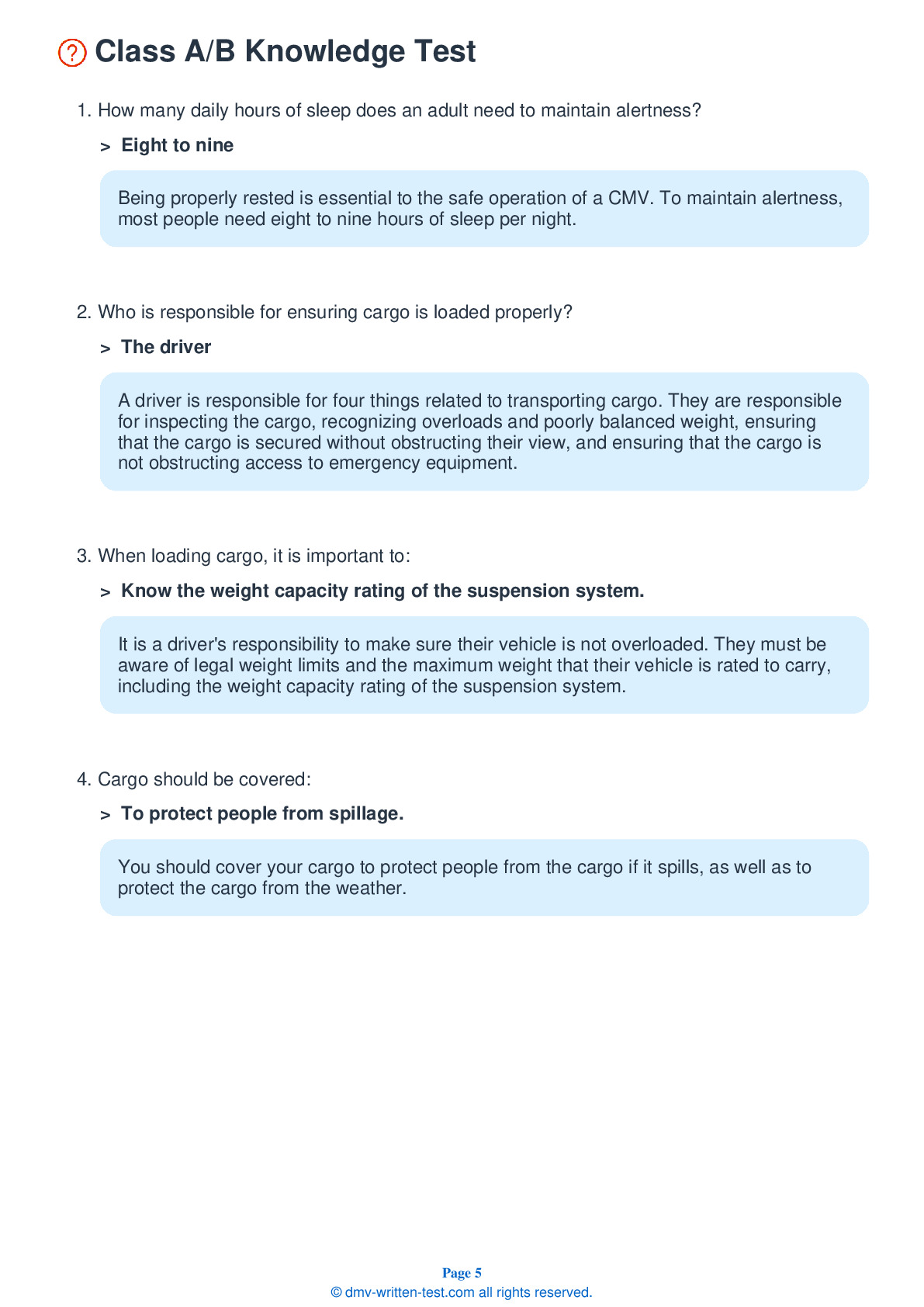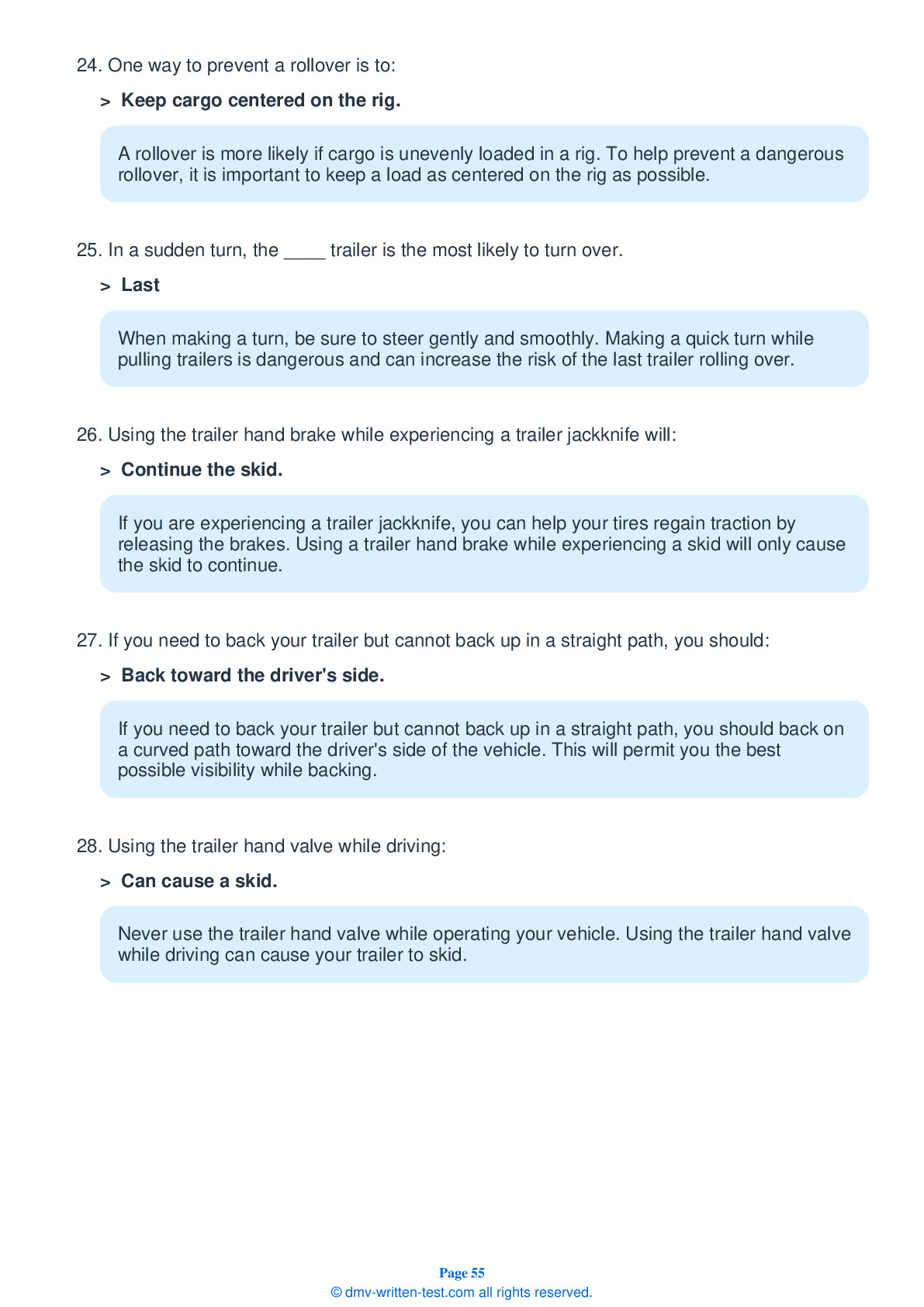Knowledge Test Class B
This license is required for driving a single vehicle with a GVWR of more than 26,001 pounds, and a trailer not to exceed 10,000 pounds gross vehicle weight rating, or a vehicle designed to transport 24 or more people (including the driver). To receive this license, applicants must pass a 50-question test. To pass, applicants must answer 40 questions correctly. Each question has four possible answer choices. Test questions come from the New Jersey Commercial Driver License Manual. Questions come from chapters covering: Introduction, Driving Safely, Transporting Cargo Safely, Air Brakes (if applicable), Pre-Trip Vehicle Inspection Test, Basic Vehicle Control Skills Test and On-Road Driving.. Endorsements that may be used with a Class B CDL are: Hazardous materials, Tank, Passenger, HazMat and Tank, Air Brakes and School bus.
8. When driving in heavy traffic, you should:
Areas with heavy traffic, road construction, large numbers of pedestrians, or severe weather demand extra attention from a driver. The driver should avoid all possible distractions while in such areas, including cell phone use.
9. During a static leakage test, the maximum leakage rate for a single vehicle with air brakes is ____ in one minute.
When performing a static leakage test on a single vehicle with air brakes, the leakage rate should be no more than 2 psi in a minute. If air leaks from the air brake system at a quicker rate, the vehicle should not be driven because something likely needs to be repaired.
10. What is a danger of rolling back when you start to accelerate?
To avoid hitting someone or something behind you, it is important to ensure that your vehicle does not roll backwards when starting from a stop. If your vehicle has a manual transmission, partly engage the clutch before taking your foot off the brake.
11. When pulled off on the side of the road, a driver should:
If you must stop on the side of the road, it is important that you turn on your emergency flashers as a warning to other drivers. This is especially important if you are stopped at night.
12. When inspecting cargo, the driver should do all of the following, except:
Cargo should be inspected by a driver to ensure that it is properly secured, balanced, and not exceeding weight limits.
13. A modulating control valve can control the:
A modulating control valve allows a driver to gradually apply spring brakes. In equipped vehicles, the valve is controlled by a lever located on the dashboard.
14. If feeling tired and frequently yawning, you should:
Frequent yawning is a warning sign of fatigue. If you become tired while driving, the only safe response is to stop and get some sleep. You cannot rely on artificial stimulants, like caffeine, to keep you alert because they will eventually wear off and leave you more tired than you originally were.
Frequently Asked Questions
Here are the steps to obtain a Class B CDL license in New Jersey:
1. Obtain a commercial learner's permit (CLP) by passing the written knowledge test for Class B vehicles at a New Jersey Motor Vehicle Commission (MVC) office. You must be at least 18 years old to obtain a CLP.
2. Hold your CLP for at least 14 days before taking the road test.
3. Schedule and pass the road test for Class B vehicles at an MVC office. The road test consists of a pre-trip inspection, basic vehicle control skills, and an on-road driving test.
4. Submit the necessary documentation and pay the fee to upgrade your CLP to a Class B CDL at an MVC office.
It is important to note that additional endorsements may be required depending on the type of vehicle you plan to operate. For example, if you plan to operate a vehicle carrying hazardous materials, you will need to obtain a Hazardous Materials (H) endorsement in addition to your Class B CDL license.
Here are some examples of vehicles that you can operate with a Class B CDL license:
1. Straight trucks
2. Dump trucks
3. Box trucks
4. Delivery trucks
5. Large buses (such as school buses)
6. Tow trucks (with certain weight limitations)
It’s important to note that if you plan to operate a vehicle carrying hazardous materials, you will need to obtain a Hazardous Materials (H) endorsement in addition to your Class B CDL license. Additionally, if you want to drive passengers for hire (such as on a bus), you may need to obtain a Passenger (P) endorsement.
1. Be at least 18 years of age to drive within the state of New Jersey, and at least 21 years of age for interstate driving.
2. Hold a valid New Jersey driver's license.
3. Provide proof of your identity and residency in New Jersey.
4. Pass a Department of Transportation (DOT) medical examination and obtain a medical certificate.
5. Obtain a commercial learner's permit (CLP) by passing the written knowledge test for Class B vehicles at a New Jersey Motor Vehicle Commission (MVC) office.
6. Hold your CLP for at least 14 days before taking the road test.
7. Schedule and pass the road test for Class B vehicles at an MVC office. The road test consists of a pre-trip inspection, basic vehicle control skills, and an on-road driving test.
8. Submit the necessary documentation and pay the fee to upgrade your CLP to a Class B CDL at an MVC office.
It is also important to note that you may be required to provide additional documentation or pass additional tests depending on the type of vehicle you plan to operate or any endorsements you may need to obtain.
It is important to note that even if you are 18 years of age or older and have a Class B CDL, you may still be subject to certain restrictions on the type of vehicles you can operate or the routes you can take, depending on your driving experience and endorsements.
The following are the types of endorsements that may be required for a Class B CDL license in New Jersey:
1. Passenger (P) endorsement: Required to operate a vehicle designed to transport 16 or more passengers, including the driver.
2. School Bus (S) endorsement: Required to operate a school bus.
3. Tank (N) endorsement: Required to operate a vehicle that is used to transport liquids or gases in bulk containers with a total capacity of 1,000 gallons or more.
4. Hazardous Materials (H) endorsement: Required to transport hazardous materials, as defined by the FMCSA.
To obtain any of these endorsements, you must pass additional knowledge and skills tests beyond those required for your Class B CDL license. Additionally, some endorsements may require background checks or other additional steps before they can be added to your CDL license.
1. Pre-trip inspection: The pre-trip inspection test assesses your ability to inspect your vehicle to ensure that it is safe for operation. You will be asked to demonstrate a thorough knowledge of the vehicle's components, such as the engine, brakes, steering, lights, and tires.
2. Basic vehicle control: The basic vehicle control test assesses your ability to control your vehicle in a controlled, off-street setting. You will be asked to perform maneuvers such as straight-line backing, offset backing, parallel parking, and alley docking.
3. On-road driving: The on-road driving test assesses your ability to safely operate your vehicle on public roads and highways. You will be asked to drive through various traffic situations such as intersections, turns, lane changes, and railroad crossings.
During the skills test, you will be evaluated on your ability to safely and efficiently operate a commercial vehicle. To pass the test, you must demonstrate good driving habits and meet or exceed the minimum requirements for each section of the test.
The following are some common restrictions or limitations for Class B CDL drivers:
1. Passenger restrictions: If you have a Class B CDL license with a passenger endorsement (P), you may be limited in the number of passengers you can transport and the type of vehicle you can operate.
2. Air Brake restrictions: If you took your skills test in a vehicle without air brakes, your CDL license will be restricted to vehicles without air brakes. If you want to remove this restriction, you will need to retake the skills test in a vehicle with air brakes.
3. Tank vehicle restrictions: If you have a Class B CDL license with a tank endorsement (N), you may be limited to operating vehicles that transport liquids or gases in bulk containers with a total capacity of less than 1,000 gallons.
4. Hazardous materials restrictions: If you have a Class B CDL license with a hazardous materials endorsement (H), there may be additional restrictions on the types of hazardous materials you can transport and the routes you can take.
It is important to understand and comply with all restrictions and limitations associated with your Class B CDL license to ensure that you are operating your vehicle safely and legally.
To take the test in a language other than English, you will need to request a foreign language interpreter or a translated version of the test. The request must be made at the time you schedule your test appointment with the MVC.
It is important to note that even if you take the written test in a language other than English, you will still need to demonstrate your ability to communicate in English during the pre-trip inspection and on-road driving portions of the CDL skills test.
If you have any questions or concerns about taking the Class B CDL written test in a language other than English, you can contact the New Jersey MVC for more information and assistance.
To request accommodations, you will need to fill out a Request for Accommodation of Individuals with Disabilities form, which is available on the MVC website or at any MVC office. You will need to provide documentation of your disability and the specific accommodations you are requesting.
The MVC will review your request and determine if the requested accommodations are reasonable and appropriate. Some examples of accommodations that may be provided include extended testing time, a private testing room, or a sign language interpreter.
It is important to note that you must make your request for accommodations at least 30 days before your scheduled test date to allow adequate time for the MVC to review and process your request.
If you have any questions or concerns about requesting accommodations for the Class B CDL written test, you can contact the New Jersey MVC for more information and assistance.
According to the New Jersey Motor Vehicle Commission (MVC), you must wait at least 7 days before retaking the CDL written test. If you fail the test a second time, you must wait at least 14 days before retaking it again. If you fail the test a third time, you must wait at least 21 days before retaking it.
It's important to note that there may be additional fees associated with retaking the CDL written test. You should contact the MVC for information on any applicable fees.
To prepare for your next attempt at the CDL written test, you may want to study the New Jersey Commercial Driver License Manual, which is available on the MVC website or at any MVC office. You can also consider taking a CDL practice test to help identify areas where you need additional study and practice.
If you have any questions or concerns about retaking the Class B CDL written test in New Jersey, you can contact the MVC for more information and assistance.




